
When it comes to contract negotiation, most people are focused on the outcome: Did we get what we wanted without having to give up too much? What negotiators and senior executives often overlook is that how a negotiation is conducted has a significant impact on outcomes, and ultimately on whether or not agreements are implemented successfully.
Data from our latest Customer-Supplier Negotiation Study, which surveyed executives, managers, and individual contributors from over 300 companies globally, shows that companies that realize the greatest value define clear negotiation strategies, follow a formal negotiation process, employ disciplined planning and preparation, and adapt their strategies as their negotiating partners change.
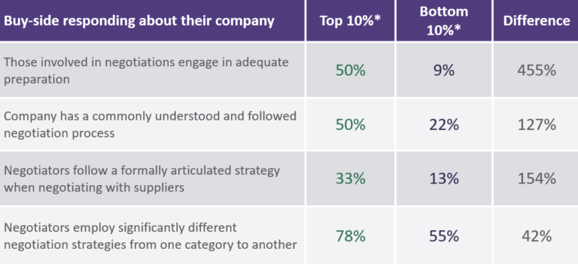
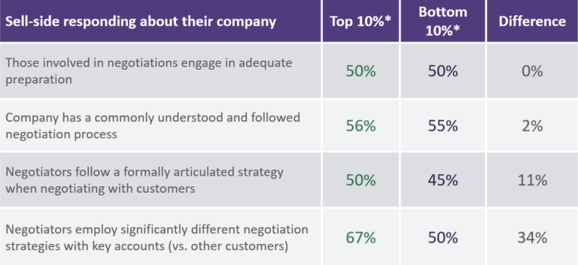
A Formally Defined and Documented Negotiation Process
Our research shows that the discipline of negotiation continues to evolve from art to science, from an ad hoc activity to a formal business process. Following a standardized, methodical approach to negotiations, ensures the right parties are involved at the right times, and in the right ways; that effective positioning and planning occurs, and that lessons learned from prior negotiations are leveraged. This in turn makes negotiations more predictable and efficient, and increases leverage – which leads to better negotiated outcomes.
A Collaborative Approach to Negotiation
It’s common to view negotiation as an adversarial process, with negotiating parties’ objectives directly opposed. But our study indicates that taking an adversarial approach to negotiation is generally counterproductive.
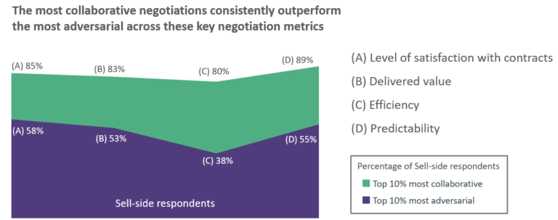
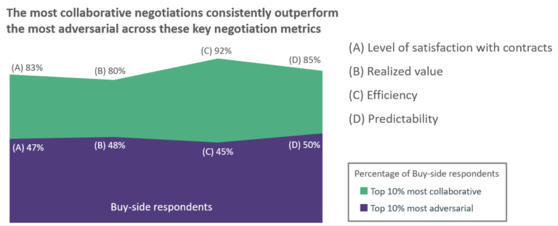
It may be difficult to shift toward a collaborative approach when an adversarial approach is deeply embedded in team culture, but it’s helpful to remember that collaboration isn’t about being soft or giving in.
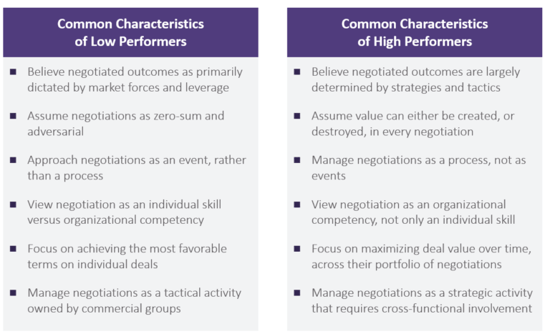
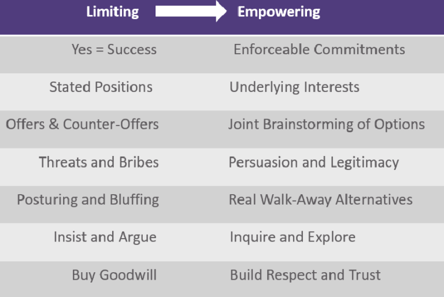
A collaborative negotiator:
- Seeks to build trust with counterparts, but is not naively trusting
- Understands that threats and other aggressive tactics often generate resistance and are thus counter-productive
- Is assertive but respectful of counterparts, and earns and demands respectful treatment from them
- Avoids haggling over opening positions and trading concessions, and instead probes for and focuses on underling interests (objectives, motivations, concerns)
- Seeks to resolve disagreement based on what is fair and reasonable (which produces sustainable agreements), versus pressure tactics (which result in agreements that often unravel)
- Systematically manages communication, aiming for the benefit of more transparency rather than less, while being strategic about what to disclose and not
- Doesn’t rush into commitments or pressure others to do so
When a negotiation is collaborative, both sides are more likely to be predisposed toward an efficient, predictable, and mutually satisfactory implementation of an agreement.
Diagnosing and Treating Inefficient, Unpredictable Implementations
Defining and documenting a formal negotiation process, one that emphasizes a non-naïve, collaborative approach, can have a major impact on the value of your agreements and business relationships. Do you and your company have room for improvement?
.png?width=512&height=130&name=vantage-logo(2).png)

